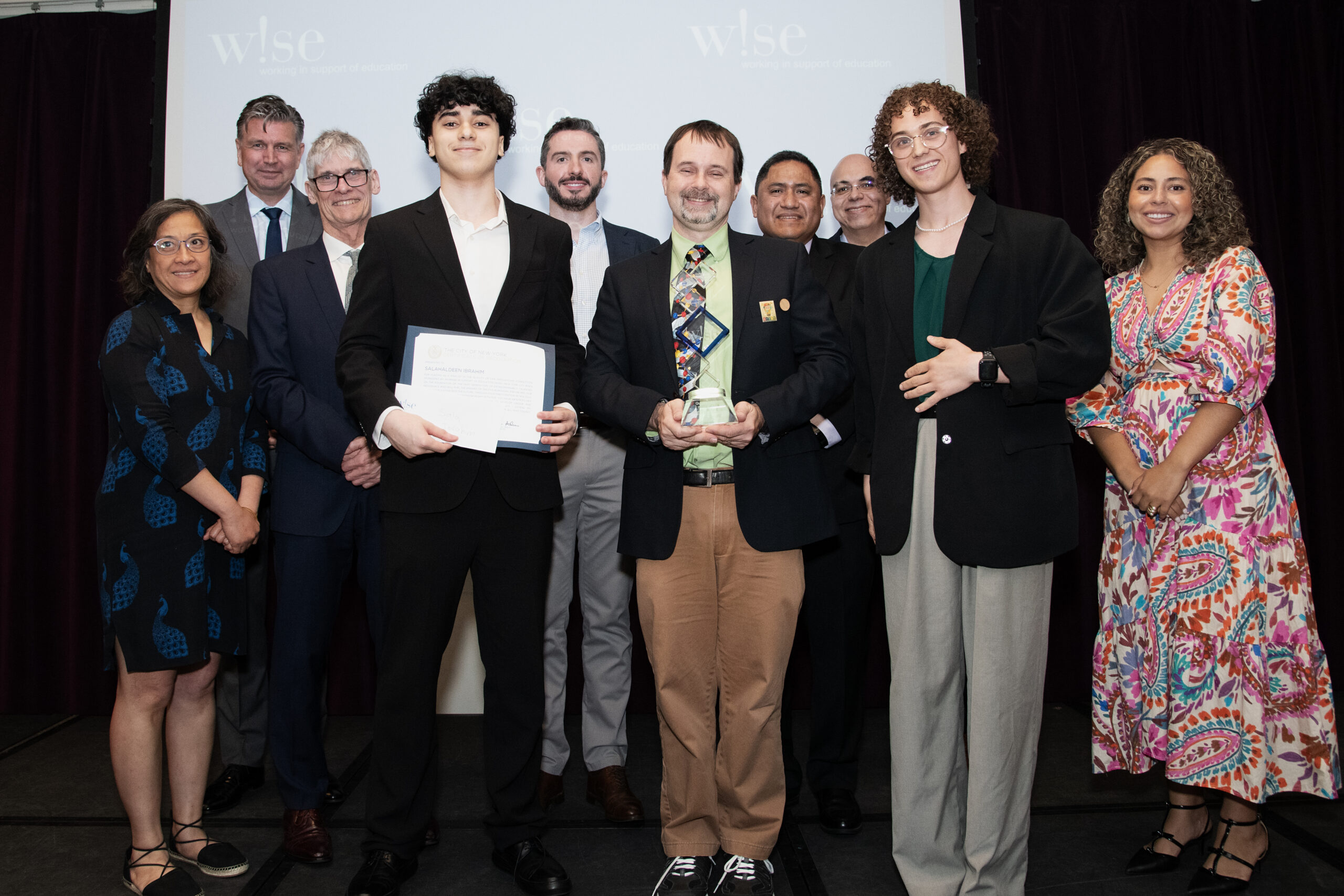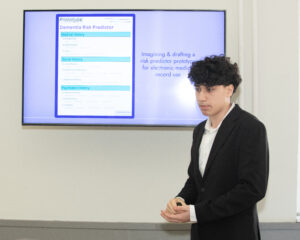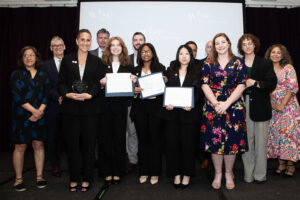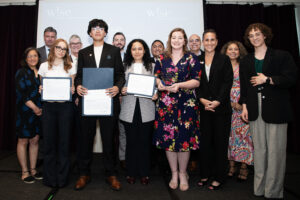About the Program
*NY Seal of Civic Readiness Approved*
2025-26 Registration NOW OPEN!
Quality of Life INNOVATIONS (QLI) is a unique social entrepreneurship initiative that fosters a spirit of civic engagement and social innovation among high school students, while helping them prepare for college. Students identify a community issue they care about, conduct primary and secondary research to examine the issue and develop and implement feasible proposals for change. Proposals can compete for college scholarships.

Sign Up for QLI Newsletters Volunteer
Request More Information
How QLI works
Students from each participating school work either individually or in teams of up to three with support from a teacher. W!se provides a Student Handbook, Teacher’s Guide and Curriculum Toolkit, as well as webinars and workshops to help them prepare.
In April, students submit a college-level paper containing their analysis, findings, recommendations and implementation plan. The papers are judged and rated, with the top students/teams advancing to a final round, where they present their proposals in person to a panel of judges. Scholarship money is awarded to the top three students/teams; additional prizes go to the other finalists and semifinalists.
2025 Winning Proposals
The 2025 First Place scholarship was awarded to Salahaldeen Ibrahim from Staten Island Technical High School for his proposal: “Peace of Mind: Piloting a Dementia Risk Prediction Tool”.
While dementia has devastating effects on individuals and families, early diagnosis remains elusive and expensive—especially for marginalized communities. To address this, Salahaldeen Ibrahim developed “Peace of Mind,” a machine learning model that predicts the risk of five dementia subtypes using routine clinical data already found in medical charts. Unlike costly genetic testing, this tool is accessible, scalable, and achieved over 85% accuracy during testing with a national dataset. He interviewed neurologists and researchers from Mount Sinai, all of whom emphasized the urgent need for earlier diagnosis tools, and one lab even piloted my prototype. The tool empowers patients and families to plan proactively, alleviates caregiver burden, and sets a new standard for compassionate neurological care. With continued testing and institutional support, this innovation could transform dementia prediction and improve quality of life nationwide.

Second place was awarded to Tamana Saini, Zoe Sharapov, and Jenny Ye from Forest Hills High School for their proposal: “Ready, Set, Safe: Creating Emergency Ready NYC Youth”.
Tamana Saini, Zoe Sharapov, and Jenny Ye developed “Ready, Set, Safe” to address the lack of emergency preparedness among children by creating a fun, multilingual lesson for NYC 4th and 5th graders. Partnering with EMTs, firefighters, and teachers, they taught 656 students life-saving skills like calling 911 and responding to medical emergencies. Pre-lesson surveys revealed major gaps in knowledge, but after the lessons, 92.6% of students felt more prepared. With strong support from educators and city officials, this low-cost, student-led program has the potential to scale citywide—empowering kids to respond confidently in emergencies.

Third place was awarded to Angel Mizhquiri, Anisa Akobirova, and Emily Padilla from Forest Hills High School for their proposal “S.H.E.L.L.: Students Helping English Language Learners”.
Angel Mizhquiri, Anisa Akobirova, and Emily Padilla developed “S.H.E.L.L.,” a peer tutoring program that tackles the academic and social challenges faced by ELL students (English Language Learners), many of whom struggle to graduate. After surveying over 120 ELL students, they launched S.H.E.L.L. with bilingual volunteers offering tutoring during and after school. The results were powerful: 100% of participants improved academically, and 80% felt more confident in class. Praised by faculty and city officials—and winning first place at the MyImpact Civics Fair—this zero-cost, scalable model strengthens school communities by supporting some of their most vulnerable students.

To view more photos, click here.
2024 Winning Proposals
The 2024 First Place scholarship was awarded to Mika Desiderio, Ruxin Dun, and Anya Kumari from Forest Hills High School for their proposal: “Waste Not Want Not: Creating Sustainable Food Waste Management in Schools”. A structured composting program educating students about recycling and reducing school waste. Their research found that the school discards about 2,800 pounds of food and waste weekly, contributing to greenhouse gas emissions. NYC public schools produce around 40,000 tons of recyclable waste, making them ideal for composting programs. Motivated by composting’s environmental benefits, they implemented a program at their school, including student education on the process and its impact. We collaborated with kitchen staff to measure lunchroom waste, obtained administrative approval, and worked with Zero Waste Schools to create recycling stations and educational resources. An assembly educated students, and 85.3% expressed excitement about the program. Student volunteers earned service hours, and the composting program reduced lunchroom waste by 2,700 pounds per week, demonstrating its success.
Second Place was awarded to Ethan Shimanov, Ethan Liu, and Wenwen Ma from Forest Hills High School for their proposal: “Operation Green Day: Digging In To Cultivate Happiness and Health”. Under the shining sun, students plant pansies, smiling despite their aching backs and knees. Connecting with nature positively affects physical and mental health. Their school has a dedicated green space, but their survey found that 49% of students didn’t know about it, and 36% believed it didn’t exist. This highlights students’ lack of awareness of green spaces. Interacting with nature improves mental health, so they organized Green Day, where students weeded, planted flowers, and cleaned the school area. They also created a volunteer manual with resources for connecting with nature outside school. As a result, volunteers learned new skills, interacted directly with nature, and helped to beautify their school in the process. A participating teacher noted that students made new social connections and fostered community. Post-survey responses showed 90.8% of students felt more connected to nature after Green Day. Over time, students found they had cultivated happiness and health alongside the flowers.
Third place was a tie between Jenna Motylev from James Madison for “The Hidden Secrets Behind Energy Drinks” and Aiza Tahir from Midwood High School for “From Pixels to Personality: The Cognitive Impact of Technological Devices on Adolescent Behavior”.
View More Past Winners“I really loved that exhilarating feeling when my partner and I finally saw the effects of our implementation. It took us an entire year’s worth of hard work until we were able to get our idea going. When we saw just how effective our implementation was, we were thrilled that we actually contributed to our community!” Rebecca, Staten Island Technical High School
“Research supports the Quality of Life INNOVATIONS program because it provides students with an opportunity to learn important skills that will support them in college and beyond. The students learn such skills as research, writing, and the importance of being civically engaged, with my favorite (and important part) being how the students implement their proposal.” Erin Baskett, Managing Partner and CFO/CCO of Autonomous Research, a sponsor of QLI